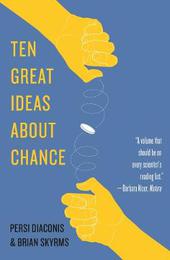
|
Ten Great Ideas about Chance
Paperback / softback
Main Details
| Title |
Ten Great Ideas about Chance
|
| Authors and Contributors |
By (author) Persi Diaconis
|
|
By (author) Brian Skyrms
|
| Physical Properties |
| Format:Paperback / softback | | Pages:272 | | Dimensions(mm): Height 203,Width 133 |
|
| Category/Genre | Mathematics
Probability and statistics |
|---|
| ISBN/Barcode |
9780691196398
|
| Classifications | Dewey:519.2 |
|---|
| Audience | |
|---|
| Illustrations |
44 b/w illus. 8 tables.
|
|
Publishing Details |
| Publisher |
Princeton University Press
|
| Imprint |
Princeton University Press
|
| Publication Date |
8 October 2019 |
| Publication Country |
United States
|
Description
A fascinating account of the breakthrough ideas that transformed probability and statistics In the sixteenth and seventeenth centuries, gamblers and mathematicians transformed the idea of chance from a mystery into the discipline of probability, setting the stage for a series of breakthroughs that enabled or transformed innumerable fields, from
Author Biography
Persi Diaconis is the Mary V. Sunseri Professor of Statistics and Mathematics at Stanford University and the coauthor of Magical Mathematics: The Mathematical Ideas That Animate Great Magic Tricks (Princeton). Brian Skyrms is Distinguished Professor in the Department of Logic and Philosophy at the University of California, Irvine, and Professor of Philosophy at Stanford University. His books include Signals: Evolution, Learning, and Information.
Reviews"A volume that should be on every scientist's reading list."-Barbara Kiser, Nature "A terrific book."-Mathematics Magazine "Fun and entertaining to read."-MAA Reviews "To anyone with an interest in probability or statistics, this is a book you must read. . . . [It] is far-ranging and can be read at many levels, from the novice to the expert. It is also thoroughly engaging."-David M. Bressoud, UMAP Journal "A very enriching journey. Your vision will be broadened."-Adhemar Bultheel, European Mathematical Society "A great book for anyone who wants to understand some of the central tenets of probability, how they were discovered, and how they can be tamed in our day-to-day lives."-ZME Science
|